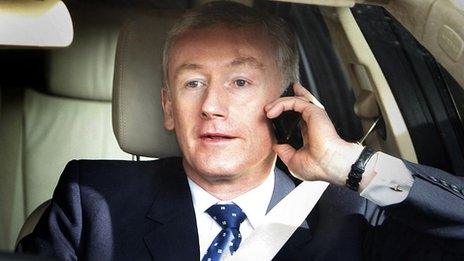Fred Goodwin: Knighthood shredded
- Published
- comments
I keep being asked whether business leaders and bankers with knighthoods, CBEs and the rest should be living in terror that they too may be stripped of their honours following the decision of Her Majesty to de-sir Fred Goodwin, on the advice of Whitehall.
I don't really think so, because Fred Goodwin was in a class of his own, at least for the UK, in terms of taking business risks that damaged the wealth of taxpayers and undermined prospects for the British economy.
Under his leadership, the balance sheet of Royal Bank of Scotland - its loans and investments - grew to £2 trillion pounds, or considerably more than the annual output of the British economy, supported by loss-absorbing capital equivalent to a fiftieth of that. Which meant that the value of its loans and investments had to fall by just 2% - a relatively tiny amount - for the bank to be bust.
And of course the bank became far too dependent on unreliable wholesale finance after its disastrous takeover of the rump of ABN Amro in the autumn of 2007.
So when it could no longer borrow on markets after the demise of Lehman, and when its loans and investments started to go bad, RBS would have been as bust as bust can be, had taxpayers not rescued it.
In that rescue, RBS has received more than £45bn of capital at risk from taxpayers, colossal emergency loans from the Bank of England, and insurance against losses provided by the Treasury.
This was nationalisation in all but name - and in fact these days the Office for National Statistics does view RBS as part of the public sector.
Right now taxpayers face losses of £22bn on their 82% shareholding in the bank. And to add insult to injury, the imperative of shrinking RBS under its new chief executive, Stephen Hester, to a manageable and safer size means that it's been unable to provide all the credit that businesses and households would have wanted and needed in these challenging times.
Of course many would argue that not all of this can be laid at Mr Goodwin's door. There were regulators, non-executive directors, executives and shareholders who surely could and should have prevented RBS taking these crazy risks.
But theirs were sins of omission.
Fred Goodwin was the chief executive; fat bonuses were reaped by him (yes the climate for these things was a bit different then); he is still enjoying the fruits of a pension pot worth around £12m; and ultimately the big strategic decisions were his.
So his were the sins of commission. And because of the unusually large economic consequences for all British people of his business errors, it is probably not surprising - and not much of a precedent - that he has been punished by the removal of his public honour.
- Published31 January 2012

- Published31 January 2012
- Published31 January 2012